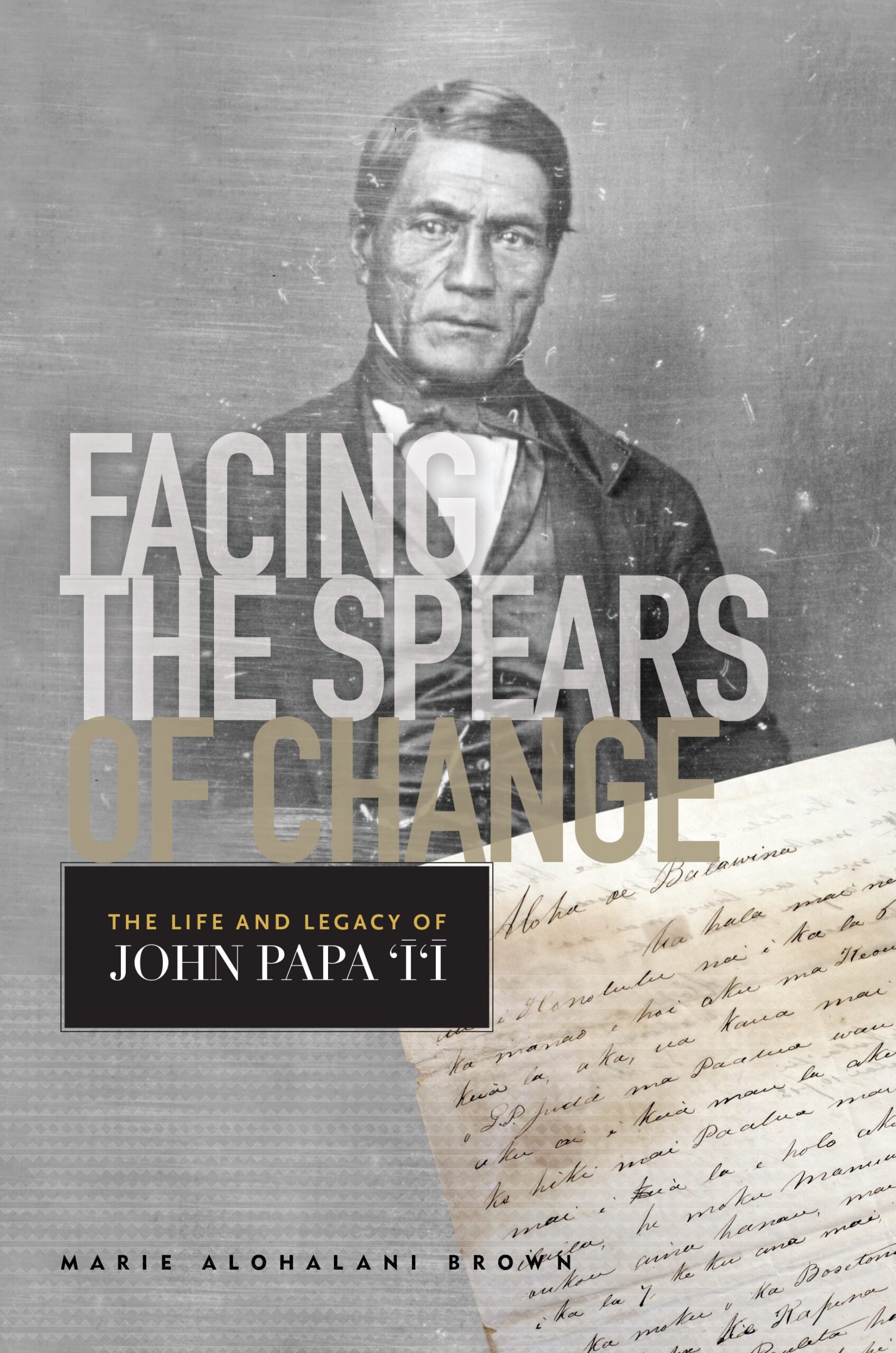Facing the Spears of Change: The Life and Legacy of John Papa `Ī`ī
Awards
- Winner of the Ka Palapala Po‘okela Awards (various categories), 2017
- About the Book
-
Facing the Spears of Change takes a close look at the extraordinary life of John Papa `Ī`ī. Over the years, `Ī`ī faced many personal and political changes and challenges in rapid succession, which he skillfully parried or seized, then used to fend off other attacks. He began serving in the household of Kamehameha I as an attendant in 1810, at the age of ten, and became highly familiar with the inner workings of the royal household. His early service took place in a time when ali`i nui (the highest-ranking Hawaiians) were considered divine and surrounded with strict kapu (sacred prohibitions); breaking a kapu pertaining to an ali`i meant death for the transgressor. He went on to become an influential statesman, privy to the shifting modes of governance adopted by the Hawaiian kingdom. `Ī`ī’s intelligence and his good standing with those he served resulted in a great degree of influence within the Hawaiian government, with his fellow Hawaiians, and with the missionaries residing in the Hawaiian Islands. As a privileged spectator and key participant, his published accounts of ali`i and his insights into early nineteenth-century Hawaiian cultural-religious practices are unsurpassed.
In this groundbreaking work, Marie Alohalani Brown offers an elegantly written and compelling portrait of an important historical figure in nineteenth-century Hawai`i. Brown’s extensive archival research using Hawaiian and English language primary sources from the 1800s allows access to information which would be otherwise unknown but to a very small circle of researchers.
- About the Author(s)
-
Marie Alohalani Brown, Author
Marie Alohalani Brown is professor, specialist in Hawaiian religion, at the University of Hawaiʻi at Mānoa.
- Reviews and Endorsements
-
- [Facing the Spears of Change] marks a turning point not just in the scholarship about ‘Ī‘ī, but also in the production of literature about Kanaka Māoli (Native Hawaiians). . . . The “Hawaiian Renaissance” of the 1970s has led to a re-examination of long-accepted narratives about Hawai‘i and its past, almost all of which rely exclusively on English-language sources. But because those sources come from a part of society that never represented more than 10 percent of the population in nineteenth-century Hawai‘i, our contemporary understanding of the period is inevitably biased. Brown, though, is among a new generation of scholars who are fluent in ‘ōlelo Hawai‘i and who have access to a treasure trove of sources written in the Islands’ mother tongue.
—Hana Hou! - Brown, a thorough researcher and discerning writer, captures the drama of the tactical battles the enterprising ‘I‘i fought to stay in favor with a succession of rulers and defend the interests of his beloved Hawaiian people. . . . Brown's excellent book casts a long-overdue light upon the personal life and brilliant career of a loyal, modest, courageous man.
—Honolulu Star-Advertiser - Brown contextualizes his work (and her own) within Kanaka life-writing traditions, arguing for the importance of adhering to its aesthetic and rhetorical strategies, including the recounting of mo‘okū‘auhau (genealogy) and mo‘olelo (history and story). . . . Aside from the cogent analysis and narrative, readers will appreciate the thoughtful inclusion of a biographical timeline, notes discussing Hawaiian terms, and photos of letters handwritten by and about ʻĪʻī' and of Ka Nupepa Kuokoa, in which ʻĪʻī' published his life-writing series. They will also value Brown's caution against relying only on translations to conduct research on Indigenous peoples and histories, as well as her sharing of the rewards and difficulties she faced while assembling and working with an extensive indigenous archive.
—Brandy Nālani McDougall, NAIS: Native American and Indigenous Studies, 5:1 (Spring 2018) - Brown’s fluency with Hawaiian language, and her abilities to comb through all available archives, both in Hawaiian and English, for the overwhelming amount of details regarding ʻĪʻī’s life, are paramount. Never before was this information readily available to the general readership in a way that presents an overall picture of his life activities.
—Hiapo Perreira, University of Hawai‘i at Hilo - Facing the Spears of Change offers a critical biography of John Papa ʻĪʻī and a reassessment of ʻĪʻī’s body of writings. His life story is a tracking of his active engagement in, and thoughtful reflections on, the vast social transformations that beset the Hawaiian people. Brown reconstructs overall ʻĪʻī’s intellectual production, not only in considering private writings (such as letters) and in reports about ʻĪʻī’s public activities, but more importantly in contextualizing ʻĪʻī’s writings in conversation with prevailing public discourses. Brown carefully weighs the content of the sources and without fail makes explicit the limitations as well as the affordances of those sources. Brown demonstrates that Hawaiian history must be written with full accounting for the immense archive of Hawaiian-language materials, both published and archival, produced over the course of the nineteenth century.
—Amy Stillman, University of Michigan
- [Facing the Spears of Change] marks a turning point not just in the scholarship about ‘Ī‘ī, but also in the production of literature about Kanaka Māoli (Native Hawaiians). . . . The “Hawaiian Renaissance” of the 1970s has led to a re-examination of long-accepted narratives about Hawai‘i and its past, almost all of which rely exclusively on English-language sources. But because those sources come from a part of society that never represented more than 10 percent of the population in nineteenth-century Hawai‘i, our contemporary understanding of the period is inevitably biased. Brown, though, is among a new generation of scholars who are fluent in ‘ōlelo Hawai‘i and who have access to a treasure trove of sources written in the Islands’ mother tongue.
- Supporting Resources
-





